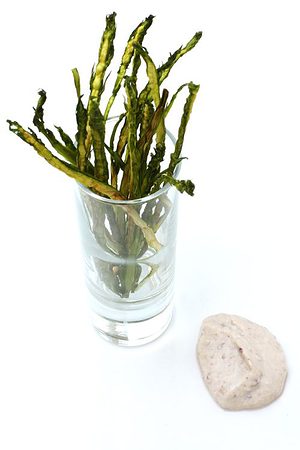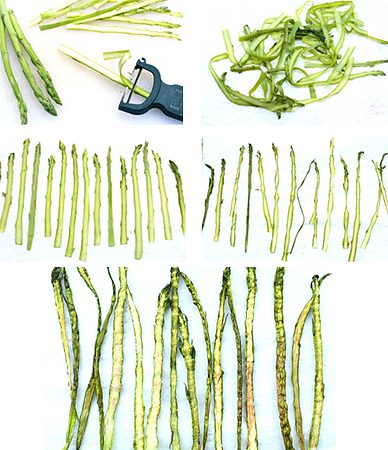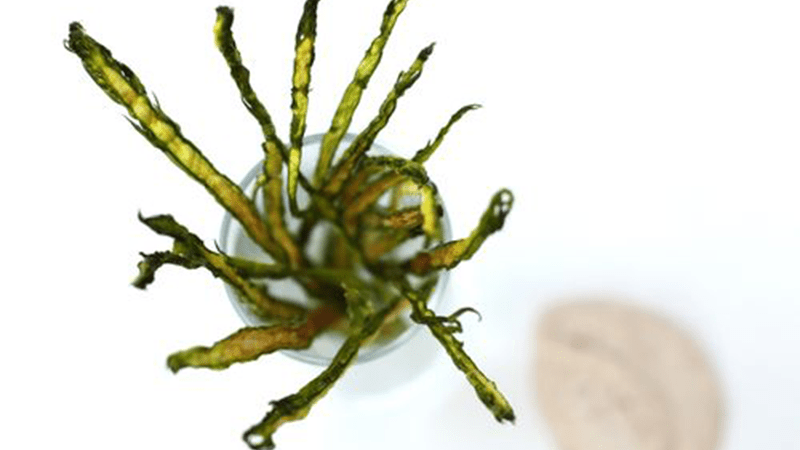If food is a form of art [and by definition, I believe it is]— it’s an exceptional one. Food has the distinction of engaging ALL of the senses. In food there is beauty, taste, aroma, texture, and sound.
The most beautiful sound that food makes is ‘crispy’. Crispy and crunchy are often used interchangeably, but there is a difference. Crispy is when a dry food meets the teeth, it offers little resistance and shatters into a brittle cadenza, while crunchy implies a thicker, denser product with a deeper resonance.
Crispy is a lilting violin; crunchy is a rotund cello.
I’ve been chasing the elusive crispy, trying to coax it from vegetables. Oh, I know there are ways…
The makers of snack foods know its addictive powers. They have the technical and practical knowledge to achieve it, but their processes and equipment are not available to the average cook.

Of course, there is always deep frying, which is ‘dry boiling’ in fat at an accelerated temperature that dehydrates, browns, and ultimately crisps. While I love the texture, flavor, and aromas that hot fat lends to food, it wasn’t what I was after.
I was chasing the type of crispy that comes from lyophilization, or freeze drying, a process that draws moisture from materials by converting the water in its cells to a solid frozen state, bypassing the liquid phase, to produce a product that is visibly unaltered and intact. Without access to this sexy beast of technology, I had to achieve the fragile crispness with only the tools available in my kitchen.
I knew the key was dehydration. In its pursuit, I moved thin shavings of asparagus from the low temperatures of a dehydrator to the higher temperatures of an oven, to no avail. In both cases, the drawing of moisture collapsed and compacted the cells, resulting in a product that I can only obliquely refer to as crisp. They had the right ‘snap’, but that was followed by an unpleasant papery chew.
Going back to square one, I restarted the process with shaved asparagus, but this time I attempted to soften the cell walls in heavily salted (1 1/2 Tblsps per quart) boiling water. Next, I spread them out on parchment and (oven) dehydrated at 150F for 30 minutes. Analyzing the shriveled, dry asparagus at this point, I wished for a fast, hot,and dry heat source to expand and puff the collapsed cells. A veil lifted, and 30 seconds later, the most underutilized and misunderstood appliance in my kitchen showed me some of its hidden potential.

Thank you microwave oven.
p.s. Crispy asparagus taste suspiciously like pistachios.
p.p.s. Beware— they are just as addictive.
Related Articles to Foodplay Recipes
- Umami Burger
- Methylcellulose Primer
- Honeycomb Candy
- In Watermelon Sugar
- Flowering Teas – Recipe
- The Easiest Recipe Microwave Chocolate Cake
- The Three Friends Of Winter
- Parrano Avocado Pineapple Recipe
- Rhubarb And Fennel Tempura Recipe

I am sure you love food. Otherwise, you won’t be here. As a full-time and a part-time chef at a local restaurant, I know my way around food. Ever since I was a young girl, I enjoyed helping my mom in the kitchen.
We would often experiment with the spices, ingredients, and flavors and create great meals for my brothers and dad. Since cocking was my first passion, I decided to go in that direction. I finished culinary school, got my first job, and started developing my skills.
Later when kids came, I had all the liberty in the kitchen to combine some of the unique flavors. A lot of them were a success, but now and there I would make a couple of mistakes.
